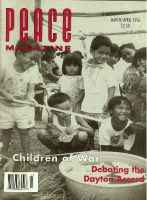
Peace Magazine Mar-Apr 1996, page 29. Some rights reserved.
Search for other articles by Derek Paul here
Doug Roche (author)
Douglas Roche, former M.P., and a past Ambassador for Disarmament during the Mulroney years, has written nearly a dozen books, on topics ranging from religion to international affairs. His work is always readable, but this book is possibly his most readable and most important. It deals mainly with nuclear weapons, their proliferation, and the Non-Proliferation Treaty (NPT), first signed in 1970. In a succinct 98 pages of the main text Roche presents the relentless facts of nuclear proliferation, a history of the 1995 NPT renewal conference, an international movement toward abolition of nuclear weapons, the role of civil society in global security, and the ethics of abolition.
Since there have been many books on nuclear arms and their control, sceptics might wonder why yet another is necessary. Roche makes this abundantly clear in the first three chapters. The weapons are not going away. The threat is still there, not only from nuclear weapon states, but from near-nuclear states and would-be nuclear states. Their various political positions on this matter are outlined in Chapter 1. The historical account of the renewal conference which put the NPT in place indefinitely is essential reading. Few nongovernmental experts on this question had recommended indefinite renewal, but Roche's history makes it very clear what the forces were that effected this step. He tells his history with the utmost objectivity, and with a minimum of finger pointing. This is a quagmire in which it is only too easy to point fingers at states that have not lived up to their NPT obligations.
The 1995 indefinite renewal was achieved without any major concessions having been granted by the nuclear weapon states. For example, it might have been hoped that the 175-odd other signatories of the Treaty could have successfully demanded the phasing out of nuclear weapons in planned stages, with definite dates for each stage. The failure of the large anti-nuclear weapon majority to achieve any such concession points to the necessity for such disarmament to be pursued by means other than through the NPT. Roche introduces this question nicely in Chapter 3.
Chapter 4 deals rather summarily with the state of the world, the pluses and minuses in the progress of the human race. It touches briefly on the increasing importance of non-governmental organizations, which have proved themselves in knowledgeand wisdom these last ten or more years. People who read widely on world affairs will be familiar with much of the Chapter 4 material.
In Chapter 5 the author addresses the ethics of abolition, and is here appealing to a wide readership of people whose religious or philosophical out-look makes them susceptible to his reasoning, especially where they have not yet given deep consideration to the crucial question of abolition.
This reviewer found illuminating material in the first three chapters of this book for readers already well informed in international affairs, while the whole book amounts to an excellent primer for the less initiated.
The book can be obtained from Project Ploughshares, Conrad Grebel College, Waterloo, Canada N2L 3G6, price in Canada: $13.95 + $2.50 (shipping).
Reviewed by Derek Paul, a retired physicist and former President of Science for Peace.

Peace Magazine Mar-Apr 1996, page 29. Some rights reserved.
Search for other articles by Derek Paul here